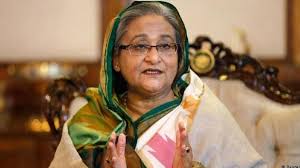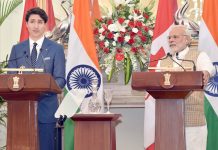Former Bangladesh Premier Sheikh Hasina’s presence in India will further fuel anti-India feelings in Bangladesh both at the level of the people and the powers that be. But will India ditch a former ally?
By KUMKUM CHADHA

The news about India and Bangladesh just does not seem to end. There is a lull for a few days and the demon rises again: this time, it is regarding the neighbouring country’s demand for extradition of former Prime Minister Sheikh Hasina.
But first, the timeline: In August this year, Bangladesh’s former Prime Minister Sheikh Hasina fled to India following weeks of protests by students over a controversial quota system in government jobs. This was just a few months after she had begun her fourth term as Prime Minister.
She has been in India since, seemingly making this her “second home” and the Indian government, quite willingly, letting her.
Sheikh Hasina has been in India for the past five months in an undisclosed location: much to the chagrin of the Yunus-led interim government in Bangladesh.
Last week, it moved in demanding that India send her back to Bangladesh for trial.
This follows the Bangladesh International Crimes Tribunal issuing arrest warrants against Hasina for committing “crimes against humanity and genocide”.
The extradition request has put India in a precarious situation. It is a toss-up between an ally and a bilateral relationship.
During Hasina’s tenure, the relationship between India and Bangladesh was kind of a dream-run. Diplomatic ties between the two countries strengthened; there was cooperation in multiple sectors and trade was at an all time high.
After the interim government under Nobel Laureate Mohammad Yunus came to power, the relationship suffered a setback.
Bilaterally, India was under a lens; within Bangladesh Hindus were targeted; temples vandalized and a monk arrested on charges of sedition.
India’s Foreign Secretary Vikram Misri travelled to Bangladesh to express India’s concerns: the first high-level visit by an Indian official to Bangladesh since Hasina’s ouster.
On her part, Sheikh Hasina accused the Yunus government of perpetrating “genocide” and failing to protect minorities, especially the Hindus: echoing what the Indian government has been saying all along.
But this is less about Sheikh Hasina and more about India. It is about persecution of Hindus in a country that India helped liberate; it is about the anti-India sentiment that has reignited; and it is about India being an “overbearing neighbor” and Hasina’s subservience to it: “an unequal relationship” to describe the majority sentiment.
As for persecution of Hindus, it is nothing new. Even though Hindu minorities in Bangladesh are seen as supporters of Sheikh Hasina’s Awami League Party, even during her reign, they were easy targets.
In 2021 communal violence had erupted in Bangladesh and over a hundred temples were destroyed. India had then chosen to look the other way. But this year around when Durga Puja festivities in Bangladesh were disrupted, the Indian government slammed it as “Systematic desecration”.
While India’s objections were in order this time around, its silence on communal violence when Hasina was in power has evoked mixed reactions. Also, the finger pointing.
Can one ignore India going overboard in its support for Hasina’s government? How does it justify cajoling her even after the sentiment in Bangladesh is against her? Can one, then, fault the interim government under Dr. Mohammed Yunus to write off India as a reliable and dependable ally?
For starters, the asylum to Sheikh Hasina is under scrutiny. When she fled her country, her obvious and immediate choice was India. She sought asylum and India granted her one.
It is no one’s case to suggest that India should have turned her or any ally or a former Head of State when they came knocking. Giving refuge to one in distress is, as a government source said, “an honourable gesture expected from any neighbour”.
That given, the issue is Hasina’s extended and perhaps indefinite stay in India.
When Sheikh Hasina had landed here after her ouster, it was flagged as a temporary refuge.
There were reports of her seeking asylum in the United Kingdom. A technical glitch has stalled the process.
When India’s Foreign Minister S. Jaishankar had informed the Indian Parliament of her sudden arrival in Delhi in August, he had stated that the initial request was “for the moment only”. That this has extended to months with no signs of an immediate resolution is another matter.
The fact that India does not have any policy for refugees allows the government to be flexible in its response.
The fact that this “flexibility” is working to Hasina’s advantage is not lost to anyone, neither in India nor Bangladesh. If anything, the Indian Government is being slammed for using this as a “convenient tool” to let Hasina stay for as long as she wants.
On its part, the Indian government has not moved an inch to engage with stakeholders for Hasina’s asylum. At least, visibly.
Therefore, the Yunus-led interim government is justified in viewing India with suspicion as also write it off as “an adversarial neighbor”.
Equally, the people in Bangladesh would vent their anger and angst towards India is expected. That it has targeted Hindus and resulted in large scale violence is unfortunate.
Adding fuel to the fire is India’s alleged complicity in letting Sheikh Hasina make political statements against the current regime in Bangladesh from its soil.
In a virtual address ahead of Misri’s visit to Bangladesh, Hasina accused the Yunus regime of being “fascist” and one that has allowed a free run to terrorists.
But what was significant was Hasina’s specific reference to attacks on minorities in Bangladesh. This was seen as a deliberate move to position herself as someone parroting concerns that India is attempting to tackle diplomatically and bi-laterally.
At this junction, one is constrained to ask: Why is the Indian Government not restraining Sheikh Hasina? Why is it allowing her to muddy the political waters? Why is it letting the Indian soil be a convenient platform for political-speak? And why is it letting Hasina hit out at a regime that India has to mend a completely fractured relationship with?
These questions are not restricted to the corridors of power but have spilled to the streets.
Consequently, the targeting of Hindus may be rooted in religious discrimination but one cannot delink the common man’s anger at India “protecting Hasina at all costs”.
All eyes are now on India’s next move: Will it or will it not extradite Sheikh Hasina?
While Bangladesh has confirmed that a diplomatic note has been sent to India seeking Hasina’s extradition, India has said it has “no comments” on the issue.
India is likely to take its time on the request. It may also put to good use its “long tradition of receiving guests”, the Dalai Lama being a case in point.
In any case, the India Bangladesh Extradition Treaty allows India to refuse extradition if the offence in question is political in nature. The Treaty, however, lists crimes which would not be deemed to be politically motivated including murder. Sheikh Hasina has been charged with murder.
But this is less about the written word and more about perception.
There is a mistrust between the two regimes since Hasina’s ouster and her subsequent refuge in India.
The Yunus government has made it known that India needs to “reconfigure bilateral ties in the light of new realities”.
Therefore, India needs to recalibrate its approach and tread with utmost caution.
Hasina’s presence in India will further strengthen the anti-India feelings in Bangladesh both at the level of the people and the powers that be.
But will India ditch a former ally? Or will it risk undermining ties with Bangladesh? Will it give in to the pressure by the interim government? Or will it soft pedal the issue till an elected government is formed? The jury is out.












